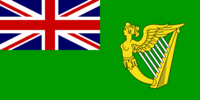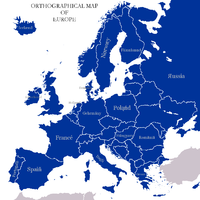Polish-Lithuanian Empire
 Flag of the Polish-Lithuanian Empire, which later served as an inspiration for the flag of the United Kingdom and the Guinness logo. | |
 The Commonwealth at its greatest extent | |
|
National mottos: | |
| Official languages | Polish, Latin and Ebonics (the latter in the Grand Duchy of Lithuania) |
|---|---|
| Religion | Roman Catholic |
| Capitals | Kraków |
| Largest City | Gdańsk |
| Head of state | King of Poland, Grand Duke of Lithuania |
| Area | about 1 million km² |
| Population | about 11 million |
| Existed | 1337–1793 |
The Polish-Lithuanian Empire, also called the "Polish-Lithuanian Commonwealth", "First Coalition of the Willing" or simply, the "Commonwealth", came about as a result of the Anschlußs. The government was styled as a federal anachronistic republic that was formed in 1569 by the strong and noble Kingdom of Poland, though the Lithuania may have played some sort of minor role. The union lasted until Lithuania started cheating on Poland and eventually admitted to having an affair with Russia[1]. The entire spectacle was aired live during a British-sponsored tea party in 1795. As a result, Poland broke up with Lithuania.
The true extent of the Polish-Lithuanian Empire during its Golden Age is a widely-debated topic. Some have claimed to have seen an official map of the Commonwealth, but not without the aid of street drugs. Records indicate that the Polish-Lithuanian Empire may have spanned either part of Europe or all of Earth.
By combining Poland and Lithuania - and due to the fact that one of them has always been the greatest[2] by some estimates[3] - the Polish-Lithuanian Commonwealth was able to be really frickin' great.
History[edit | edit source]
The history of the Polish-Lithuanian Commonwealth is a tale that has captivated and inspired millions[4]. Here are the basics you will need to hold a basic conversation with a Pole:
Founding[edit | edit source]
In 1570, the Constitutional Convention of the Polish-Lithuanian Commonwealth (Sejim) finalized the terms of the marriage between Lithuania and Poland. Poland advocated a Constitutional Monarchy with a system of Czechs and Belarusians to ensure democratic rule and the continued existence of Poland's figurehead, the double-headed Donald Duck. The Lithuanians, on the other hand, argued that an aristocracy of ducks, operating as a sort of feudalistic aristocracy, was the best solution. In the end, the two came to a compromise: the double-headed Donald Duck remained the figurehead and there was democracy, but the positions of power were only given to immigrants from Paraguay with birthdays in late November. It is believed that this compromise later had an effect on both the Soviet Union and the United States, specifically with policies of Affirmative Action.
Estonian Invasions![edit | edit source]
Shortly following the Acts of Union which fused the Polish and Lithuanian crowns, a new crown had to be fashioned because the metallurgist had no idea what he was doing and the combined crown looked like shit. Shortly after the new combined crown was finished to everyone's liking, a great evil arose that threatened to destroy everything. On January 4, 1445, large hordes of primitive, evil father-raping Estonians, jealous of the combined Polish-Lithuanian vision, began to conduct raids into the northern portion of the Commonwealth. These armies were able to win the decisive Battle of the Coral Sea before finally surrendering at Waco. However, this was not before they were able to take Wilno,[5] the most important city on Earth at the time.[6] Despite the defeat at Waco, the Estonians continued to send armies and conduct raids because they were evil.
Lech the Great (est ever)[edit | edit source]
Prince Lech of Poland-Lithuania, the son of King Blechhh from Lithuania, was a rather dashing fellow, as Herodotus points out. In 1453, he inherited the throne from his father, Blechhh I, and was crowned Lech I, King of Poland, Duke of Lithuania, and Prince of Persia. A staunch patriot and closet homosexual, he immediately came up with a plan to preserve his realm so that he could find time for a gay orgy.
Lech advocated a non-violent policy to confront the evil, bastardous, bloodthirsty Estonian Empire: economic imperialism. The reliance on non-violence was a decision that would later inspire Martin Luther.[7] Sure enough, by exporting its manufactured wares and flooding Estonian markets, the Commonwealth brought the warlike Estonians to their knees. Within five years, Estonia was completely dependent on Polish markets and goods. Estonia's people were pacified and they no longer wanted to fight. And they were hooked on Polish opium.
Although the Commonwealth always advocated non-violence and helping old women cross the street, it could not help but notice that its northern neighbors needed to be taught a lesson. So, Lech and the Polish-Lithuanian forces invaded Estonian-occupied Latvia. The goal was to spread charity, goodwill and tolerance. The Latvians, thrilled by their conquerors and grateful to the Poles and the Lithuanians, I guess they were a part of this Commonwealth, too., offered their unconditional assistance to the Poliish-Lituanian campaign, known as "Operation Spread Happiness". Adding the Latvians as an ally, the Polish and Lithuanian forces were able to overun what little foolish oppositon remained in the Baltic region, liberating and freeing the Estonian city of Riga from the Estonians. Taking the tip from everyone else but the Poles, Lech considered razing the town. However, he ultimately decided that he would stick with the Polish tradition of goodwill and instead plant a bed of flowers in the Riga city centre.
Obtaining allies everywhere they went, the Polish-Lithuanian Commonwealth set out to conquer the rest of Earth. Eventually, however, Lech and the rest of the Commonwealth became bored with this task. As a result, efforts were then made to colonize Mars, Jupiter and some of the other "easier" planets. Historians are in disagreement over whether the Commonwealth tried to colonize Pluto which was, at the time, considered a planet.
Eventually the Commonwealth also became bored with this expedition. The Poles returned home and relinquished themselves to a simple life of editing Wikipedia and reflecting on their accomplishments. The Lithuanians were content with giving some of their land to the Poles, since they owed everything to Poland and really had nothing to do with the Commonwealth's awesomeness.
The Fall of an Empire[edit | edit source]
Despite being the Greatest Empire mankind has ever known (or will ever know), the Polish-Lithuanian Empire did not last forever. Historians attribute this to a series of weak leaders succeeding Lech XVIIII. Additionally, there was a treacherous betrayal by Hapsburg Austria in 1607, which led to a loss of the realm and its greatest porn stars.
Bankrupt, the embattled Commonwealth collapsed in 1654, but not before it sold the rights to its name to an Ottoman businessman named Mehmet, who used it to market his inn at Izmir. The Polish-Lithuanian Hotel and Casino in Izmir finally caved in on June 2, 1793, after a incident involving three guys a girl and a pizza place. The owner was forced to close the business, which was bought out by the Hiltons.
Restoration attempt[edit | edit source]
Looking to revive the Commonwealth and its "master race" status became a priority in the 1900s. This led to the rejection of the Anti-Comintern Pact, which stated that the Commonwealth was not that great. Polish politician Wladyslaw Studnicki argued that his state could at least pretend that it needed help from others to be great, but this idea was rejected. Unwilling to compromise, many Polish fiddlers escaped the country. Some time later, they returned with a young Iranian bear cub named Ivan, which they trained to carry munitions, drink beer and smoke cigars. Sadly, he left his trainers to pursue a plumbing career in North London.
Significance[edit | edit source]
Historians generally agree that the Polish-Lithuanian empire single-handedly brought Europe out of the series of diarrheac episodes now known as the Middle Ages. Some argue that the Italian Renaissance did this, but one must remember that all the major players in the Renaissance (e.g. Leonardo da Vinci, Machiavelli, Martin Luther, and Raphael) were, in fact, bastard children of Lech II, also the greatest ladies' man Earth has ever known.
Endnotes[edit | edit source]
- ↑ Lithuanians claim it was the other way around. Russia refuses to comment.
- ↑ of course, Poland was the greatest
- ↑ Polish
- ↑ of Poles
- ↑ Which Lithuanians for some reason call Vilnius.
- ↑ In fact, only Warsaw, Łódź, Kraków, Wrocław (never had another name), Gdańsk (never had another name), Szczecin (never had another name), Bydgoszcz (never had another name), Toruń (never had another name), Paris (better known as Paryż), New York (better known as Nowy Jork) and Rome (better known as Rzym) rival Wilno's glory.
- ↑ what did you expect to see here? a source?






